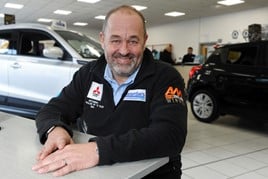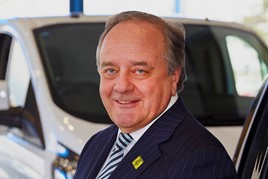Growing cases of the Omicron variant of COVID-19 expose anti-vaxxers as one of the biggest business disruptors in the automotive retail industry, it has been claimed.
As AM today (December 21) asked auto retailers about the impact of the surge in coronavirus cases across the UK, the prospect of future dealer closings and government tax support, the impact on staff and employee well-being has become a major concern for the sector.
Government data showed there were 91,743 new cases in the UK yesterday, bringing the total number of confirmed cases of the new variant in the UK to 45,145.
And Peter Smyth, director of the Swansway Group, said employees who refuse to be vaccinated are creating major problems for employers as the numbers increase.
“The main problem is our anti-vaccines,” Smyth told AM. “They come in saying they have a cold and that immediately puts the other employees on edge.
“It’s a very sensitive issue, but we had someone we had to insist he tested positive, and we sent him home immediately.
“In my opinion, everyone should be vaccinated. By not having the jab, you become one of the biggest potential disruptors in the business and put others at risk. “
Vaccines, a “difficult subject”
CarShop chief executive Nigel Hurley said the Sytner-owned auto supermarket group is encouraging all its staff to take all possible precautions to mitigate the impact of COVID-19.
 He said: “Mask wearing, social distancing, limited workspaces combined with recent vaccinations and booster shots seem to provide a higher level of confidence and protection for everyone.
He said: “Mask wearing, social distancing, limited workspaces combined with recent vaccinations and booster shots seem to provide a higher level of confidence and protection for everyone.
“We encouraged our team to have their booster jabs whenever possible.”
Robin Luscombe, chief executive of Luscombe Motors, said that while he hoped the majority of its workforce had been vaccinated against COVID-19, bringing up the subject was a “difficult question.”
 “It’s always the choice of people whether they have the jab or not, so it’s a tough thing to ask,” he said.
“It’s always the choice of people whether they have the jab or not, so it’s a tough thing to ask,” he said.
Fortunately, we haven’t had a lot of COVID-related absences, so that’s not a problem so far and – at this time of year – the reduced level of trading means we could absorb the problems a little easier. “
TrustFord chairman and CEO Stuart Foulds, Perrys chief executive Darren Ardron, and Devonshire Motors owner Nathan Tomlinson all echoed Luscombe’s point of view.
Many have experienced the absence of staff to some extent, but have so far been able to absorb their impact.
 Foulds said: “COVID absences are a real problem in various parts of our group, for example in our Parts Plus company in Warrington, it had almost been epidemic as with a large percentage of the team with COVID, whereas in d other companies, there has been little impact.
Foulds said: “COVID absences are a real problem in various parts of our group, for example in our Parts Plus company in Warrington, it had almost been epidemic as with a large percentage of the team with COVID, whereas in d other companies, there has been little impact.
“The concern is that the spread appears to be accelerating rapidly so who knows what to expect over the holiday season.”
Tomlinson said the emotional impact of COVID-19 on its workforce has been felt as much as any illness or absenteeism resulting from the pandemic.
 He added, “The big impact on business is due to the constant fear, uncertainty and doubt that fuel our daily news feeds.
He added, “The big impact on business is due to the constant fear, uncertainty and doubt that fuel our daily news feeds.
“This, along with the chain reaction of a family member, school, caregiver or business partner grappling with the effects of the pandemic, has created a completely new and unpredictable pattern that is disrupting the more. “
All of the retailers approached by AM said their companies have reinstated the strict COVID security measures from the start of the pandemic in light of the increase in cases.
Hurley suggested that “Our work environments are probably safer than at home.”
Government tax support
All retailers are hopeful that retail closures aren’t government imposed in a bid to tackle the pandemic in the New Year, with Foulds, Ardron and Hurley all saying preparations should be made to provide tax support additional to companies in such an eventuality.
Foulds said: “I think the UK and decentralized governments are in dire need of tax support plans in certain industries as we approach 2022.
“This pandemic has a fairly long shelf life so it’s likely to get worse before it gets better.
“When you see the actions other countries are doing in terms of lockdowns and major restrictions, the government simply cannot ignore the facts as they arise. “
Luscombe and Smyth have stressed that the government will be suspicious of monitoring what has proven to be a vibrant auto retail industry when it comes to COVID-19 support plans.
“The packages released last year seem a little generous now that you look at the results of many in the retail car industry,” Luscombe said. “I think the government would see this and think twice about similar action.”
Smyth said, “I would be surprised if our industry receives any help. I think the government would seriously consider separating us from its decisions on the rest of the retail industry after the recent record financial results of so many groups. “
Tomlinson said any government support should be given in a more nuanced manner than when it was first announced in 2020, saying the impact beyond profits and losses was on “the ability to recruit, retain and support those who stay on the job and work through all the challenges of resource reduction, disrupted supply and process failure ”.
He added, “The great cost pressure we face is in developing a business model that can support the present and perhaps a future of continuous change. “

